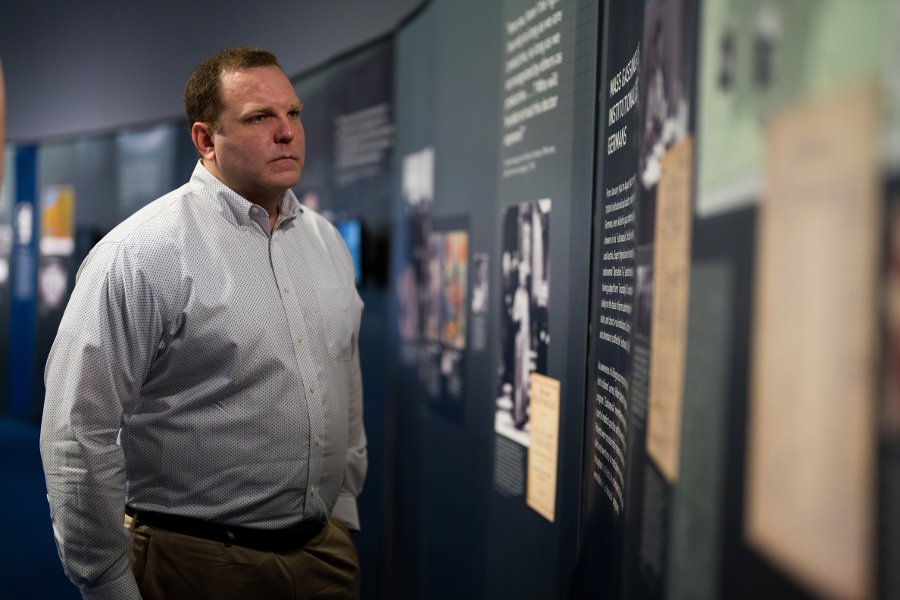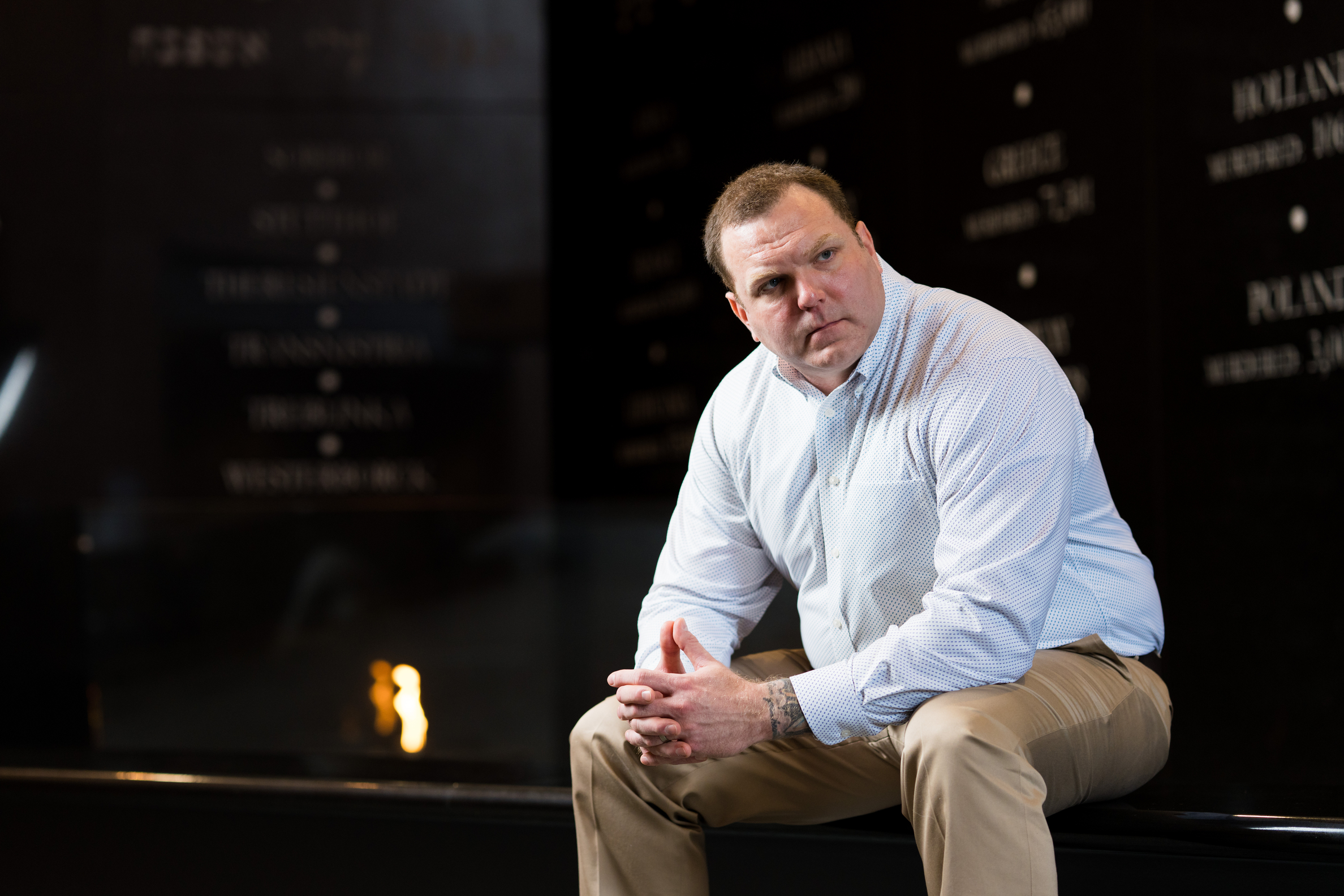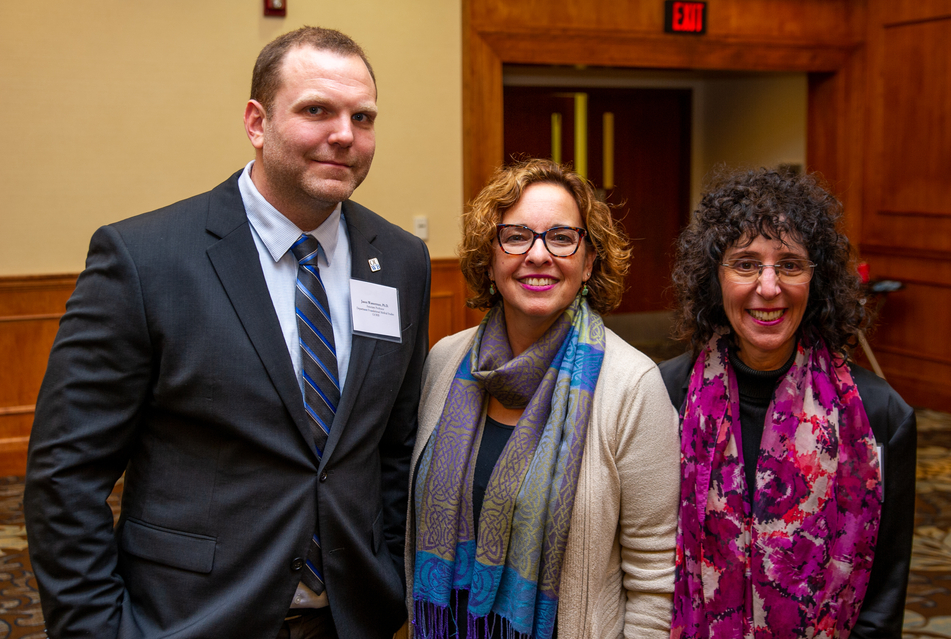
When Michael Jackson and Madonna reigned the charts, a young Jason Wasserman defiantly turned his back and probably yelled some variation of “no thanks.”
Simply put, Wasserman connected more with the music and scene of punk bands with names like Minor Threat, Dead Kennedys, Gorilla Biscuits, Unbroken, etc.
Though the imagery and music may have been brash/downright scary to some, Wasserman says he was drawn to the punk scene and everything about it — from the DIY approach to promotion and touring to the social and cultural awareness.
Eventually, punk’s heavy presence in Wasserman’s formative years would factor into his career as a bioethicist. It’s a career that includes being a well-published, associate professor in OUWB’s Department of Foundational Medical Studies. He is course director for the Medical Humanities and Clinical Bioethics (MHCB) curriculum, serves as director of Student Professionalism, and conducts ethics consultation for area hospitals.
And he can now add one more item to an already impressive CV — co-director of OUWB’s Holocaust and Medicine program. The program includes a study trip to Auschwitz, a first-of-its-kind for a U.S.-based medical school.
Even with such successes — or perhaps because of them — Wasserman never forgets his punk days.
“A lot of my career has been the equivalent of getting in a van and going to play a show in some sense,” he says. “If I want to do some research, or start some initiative, I just figure out how to do it. If I can get some money for it, great. If I can’t, I’ll figure out another way to do it and I’ll still do it because I think it's important, even if nobody else thinks it is."
‘Never follow’
 |
| Wasserman’s commitment to academia extends well beyond the classroom. He has authored and co-authored 60 published papers and 27 invited articles. |
Wasserman was born near Washington, D.C. His father was an engineer and “was constantly getting different jobs.” That meant a lot of moving for the family until Wasserman was in 11th grade and they relocated to Birmingham, Alabama.
Moving made it hard to have close friends, but he found solace in punk music.
“To find an entire music genre that was principally focused on social commentary was eye-opening for me — and I was lucky enough to get into bands that exemplify that,” he says.
While in high school, he produced a punk zine — basically, a magazine that features all kinds of punk-related content, such as social commentary, news, reviews, and more.
After graduating high school, Wasserman and a friend opened a DIY space where they hosted punk shows. He also joined two bands (both as lead singer).
“We had this '86 Dodge Ram that we would load up and drive around the country. We'd sleep in at night…it was the best time of my life, for sure,” he says.
Concurrently, he added more tattoos to his body. Today, he generally keeps them covered save the one on his wrist — a lyric from the band Hot Water Music.
It says, “Live your heart, never follow.”
Eventually, the bands he was involved with and the DIY space he co-managed, lost steam. He turned his attention to college. Kinda.
Brand new resolve
 |
| Wasserman with Hedy Wald, Ph.D. — co-director of OUWB's Holocaust and Medicine program — and Oakland University President Ora Hirsch Pescovitz, M.D. |
For as much as he loved punk, Wasserman had one other grand love that began in high school: debate.
Wasserman says he decided to take a debate course in ninth grade “on a whim.”
“I ended up falling in love with it and did it very seriously for four years, including going to debate camp in the summer and really competing,” he says.
Debate, he says, helped him understand what he could do if he put his mind to it. It also helped balance the apathy he had for things he wasn’t into.
“I would spend hours and hours doing these debate cases and competing in national tournaments…like flying to Harvard to compete in the Harvard debate tournament,” he says. “Then I would come back and get a C on my life physics test.”
When he started at University of Alabama - Birmingham, Wasserman says he took influence from punk music and his experiences with debate to concentrate on philosophy.
But it took him time to get on track as he “muddled” through the beginning of his post-secondary education. Eventually, he took a break and moved to Atlanta.
In Atlanta, he worked as a substitute high school teacher and at a Smoothie King. Through a temp agency, he also had a brief stint at a medical supply shipping company where he would work for eight hours a day over a conveyor belt assembling items like testing kits.
“I remember one time saying ‘I’m going to go back to college’ and this woman across from me said ‘I’m going to go back, too,’” he says. “She told me she had been working there for eight years and I just about broke down and thought ‘Oh my God, am I looking at myself eight years from now?’”
Wasserman returned to UAB with brand new resolve.
“I went back and was like ‘No matter what, I’m going to do this well,’” he says.
Making his mark
Upon his return, Wasserman earned straight A’s two years in a row. With a primary goal of having something “more marketable” than a philosophy degree, Wasserman also earned a master’s degree and Ph.D. — both in medical sociology — from UAB. (In graduate school, he also met his future wife, Nicole. Today, they have two children, Ellie, 10, and Everett, 5.)
His first academic job was as an assistant professor in sociology, anthropology, and social work at Texas Tech University. After three years, he moved on to become assistant professor in bioethics at Kansas City University of Medicine and Biosciences.
| More from OUWB |
Destination Poland: Students to study abroad via OUWB Holocaust and Medicine program OU, OUWB professors help tackle ethical questions at Beaumont Hospital, Royal Oak |
After another three years, in 2013, he joined OUWB as an assistant professor. In 2016, he was named associate professor.
Wasserman says he was drawn to the school in large part to the centrality of ethics and humanism to OUWB’s mission.
“It was not just rhetoric on the website, but actually manifested in the curriculum,” he says, adding that OUWB’s longitudinal courses like MHCB, Promotion and Maintenance of Health, and Art and Practice of Medicine “really demonstrate a tangible commitment.”
Wasserman’s commitment to academia extends well beyond the classroom. He has authored and co-authored 60 published papers and 27 invited articles. His work as been featured in journals such as Social Science and Medicine, American Journal of Bioethics, Hastings Center Report, Mayo Clinic Proceedings, JAMA-Pediatrics, Journal of Clinical Ethics, American Journal of Preventive Medicine, Journal of Medical Ethics, and The New England Journal of Medicine.
He's written 10 book chapters and text supplements. He’s been invited to give 38 presentations and led several workshops.
Special projects he’s been involved with are now signature OUWB programs: the Arnold P. Gold Foundational Humanism in Health and Healthcare Course; the Faircloth Lecture (a collaboration with the Counseling Department); and the annual Krug Lecture in Biomedical Ethics.
In addition to strong family support, Wasserman says he’s grateful for mentors who have been especially influential, including Ernest F. Krug III, M.Div., M.D. Krug served as Beaumont’s director of the Center for Human Development and established Beaumont's first clinical ethics consultation service. After joining the inaugural faculty at OUWB, he developed the initial MHCB longitudinal curriculum. He also was on the committee that interviewed Wasserman.
“I’ve had amazing mentors that I remain close to in different ways,” he says. “Every day I think about the lessons that I’ve learned from them.”
Despite his successes, however, Wasserman says he is not the type to sit back and reflect on all of the things he’s done. Rather, he says he is more concerned with driving toward what’s next.
By example, he points to OUWB’s Holocaust and Medicine program that includes a June 2022 study trip to Auschwitz. The curriculum includes pre- and post-trip educational sessions, as well as intensive focus on student reflection about ethics, humanism, and professional identity formation. Participants will engage in a seven-week seminar when they return and share what they learn throughout the community.
“I think (the Holocaust and Medicine program) has an opportunity to be something really special,” he says. “I have absolute faith that the kind of depth of understanding about the Holocaust that they can get through this program can inspire the kinds of sensitivities and sensibilities in our students that will make them better doctors.”
For more information, contact Andrew Dietderich, marketing writer, OUWB, at [email protected].
To request an interview, visit the OUWB Communications & Marketing webpage.
NOTICE: Except where otherwise noted, all articles are published under a Creative Commons Attribution 3.0 license. You are free to copy, distribute, adapt, transmit, or make commercial use of this work as long as you attribute Oakland University William Beaumont School of Medicine as the original creator and include a link to this article.

